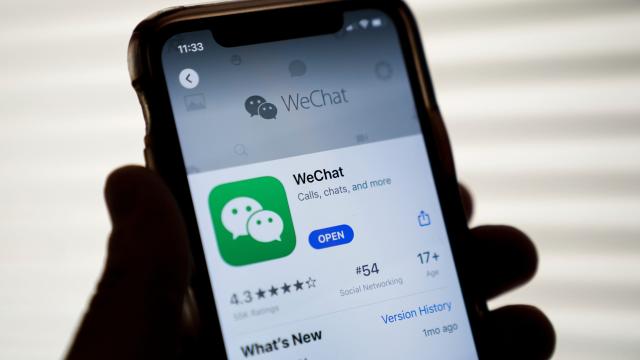In what’s the latest update to the Trump Administration’s… questionable plans for getting China-based apps off of U.S. soil, Justice Officials are now clarifying that any future crackdown on WeChat won’t explicitly target people who only download the chat platform for… chatting. This update comes courtesy of court docs filed late yesterday responding to a lawsuit filed last month by the Wechat Users Alliance, a New Jersey-based nonprofit representing the close to 20 million WeChatters in the US who would be directly impacted under the Administration’s current plans to target the app.
WeChat was one of the targets of the dual-pronged executive order that Trump signed into action at the start of August, which, on paper, sought to ban U.S. companies from doing business with either the Tencent-owned company or the ByteDance-owned TikTok, both of which were claimed to pose a “significant” (albeit entirely unproven) threat to national security. While the wording on TikTok’s order was wiggly enough to let it bypass these concerns if it was bought out by an American tech firm, the provisions for WeChat were way more stringent, banning all “transactions” between American citizens and the app itself.
But because while WeChat does facilitate payments between users, a “transaction” can be construed as just about anything — including, say, sending a text to your parents who might live overseas, or even just opening the app itself — people rightfully lost their shit. This, in turn, led to the Alliance lawyering up, which led to the backpedaling we’re seeing from the DOJ.
And of course, the backpedalling is just as vague as the order that preceded it:
While the Department of Commerce continues to review a range of transactions, including those that could directly or indirectly impact use of the WeChat app, we can provide assurances that the secretary does not intend to take actions that would target persons or groups whose only connection with WeChat is their use or downloading of the app to convey personal or business information between users, or otherwise define the relevant transactions in such a way that would impose criminal or civil liability on such users.
In other words, while use of the app for such communications could be directly or indirectly impaired through measures targeted at other transactions, use and downloading of the app for this limited purpose will not be a defined transaction, and such users will not be targeted or subject to penalties.
Yeah, I don’t really get it either.
It looks like this response, which was filed by Assistant AG Jeffrey Bossert Clark, won’t define downloading or texting on WeChat as a “transaction” that could be penalised under the order, but still leaves the door open for these users to be “directly or indirectly” harmed by whatever order eventually passes anyway.
He still refuses to define what the hell a “transaction” was supposed to mean in the first place — and reading through the court documents, it’s revealed that’s largely because the Secretary of Commerce hasn’t even come to a final decision himself on what the hell a transaction means. The EO, in other words, was vague as hell because the administration’s understanding of the apps, the ecosystems they work within, and the actual security threats they present are vague as hell, too.
Summing all that up, it looks like Clark is trying to mollify these millions of American users while… refusing to actually clarify anything about the order that got them so riled up in the first place. Meanwhile, there’s still the very likely chance that folks behind the scenes will eventually pass something that still directly harms them anyway: even if we define a “transaction” as a financial one, this wouldn’t only mean users who conduct in-app payments would be thrown under the bus, but literally every other WeChat user as well. Anyone who’s seeing ads play within their TikTok app, by definition, is engaging in a financial transaction between that user and the advertiser on the other end, since that app is making money off of their eyeballs, regardless of whether or not they ultimately click. Under the current EO, it’s likely that these sorts of shenanigans might be considered an “indirect” financial transaction, while those using WeChat’s payment system would be considered “direct” customers, but your guess (and the Administration’s, for that matter) is as good as mine.
The legal team repping the WeChat Alliance in this case shot back a filing of their own in response not long after, which can be summed up as eight pages of “dude, seriously?”:
Having first failed to articulate any actual national security concern, the administration’s latest “assurances” that users can keep using WeChat, and exchange their personal and business information, only further illustrates the hollowness and pre-textual nature of Defendants’ “national security” rationales.
Was charging dick-first into isolationism was a stupid idea after all? It’s simply impossible to say.
